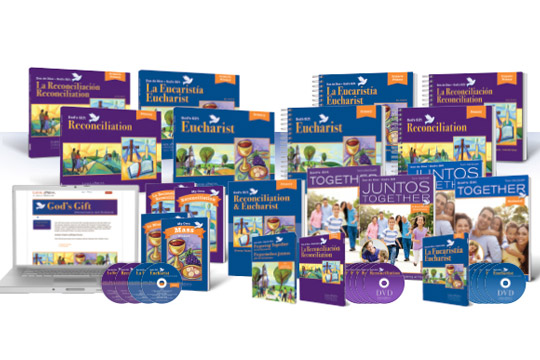
OK, I know! The Holy Spirit makes disciples! But the point that I want to make is that the Holy Spirit makes disciples through other disciples.
I bristle at promotions for catechetical resources (books or videos) that claim to do it all on their own and promise to make it “so easy” for catechists that all the catechist needs to do is, in essence, get out of the way, so that the resource can work its magic. Some resources tell catechists that all they have to do is “press play,” and a DVD will do the rest. The implied message is that anyone can do the work of a catechist if they use this particular resource.
If I seem a bit passionate about this, I am. The General Directory for Catechesis tells us that initiation into the Catholic faith is “an apprenticeship” (67), and apprenticeship occurs between an apprentice and his or her mentor in a real, human relationship. For that very reason, the GDC goes on to say that, “The gift of the Holy Spirit comes to the subject from one living person to another” (158), and that, “No methodology, no matter how well tested, can dispense with the person of the catechist in every phase of the catechetical process.”
Now, having said all that, we need to provide our catechists with the tools they need to engage young people, and that includes print resources, DVDs, CDs, online resources, and more. However, none of these replace the person using them. One of the things that I am most proud of when it comes to the work we do here at Loyola Press is the respect we have for the person of the catechist. All of our programs—Finding God, Christ Our Life, God’s Gift, and Confirmed in the Spirit—are designed to partner with well-formed catechists who use the programs and all of their features to reinforce what they themselves are doing: apprenticing young people in the faith.
Take a look at what’s available, for example, to assist a catechist using God’s Gift: Reconciliation and Eucharist.
- The Catechist Guides provide easily navigable but unparalleled support for catechists. Some catechist guides are presented as “easy to use” when in reality, they ask you to do nothing at all. Our philosophy at Loyola Press is to make guides user-friendly by providing you with what you need to engage children with the content being presented.
- The CDs provide music, Scripture stories, and guided reflections to reinforce and support what the catechist is sharing.
- The DVD video series supplements but does not replace the catechist and the concepts he or she is teaching. Even the chapter-by-chapter DVD tracks are not designed to replace the catechist in teaching the lesson but are designed to reinforce the “big idea” that the catechist has either taught or is about to teach. The “personas” on the video tracks are likeable and engaging, but they do not overpower/overshadow the person of the catechist. Rather, they are aides to the catechist, and their message is designed to embellish and reinforce the catechist’s message.
Serving as a catechist is a vocation, not a function to perform. Serving as a catechist should help the catechist to grow in faith and discipleship as much as it helps the children to do the same. Any resource that promises to “do it all” for you is not respecting you as a catechist and is not respecting the process in which disciples are truly formed. There are no shortcuts to forming disciples!






Hi Joe. Whenever the topic of initiation and apprenticeship comes up, I think of Tertullian’s comment, “Christians are made, not born.” And also the cartoon Jim Dunning would show on Forum institutes. It was a picture of sheep, and the caption read: “Shepherds don’t make sheep. Sheep make sheep.”